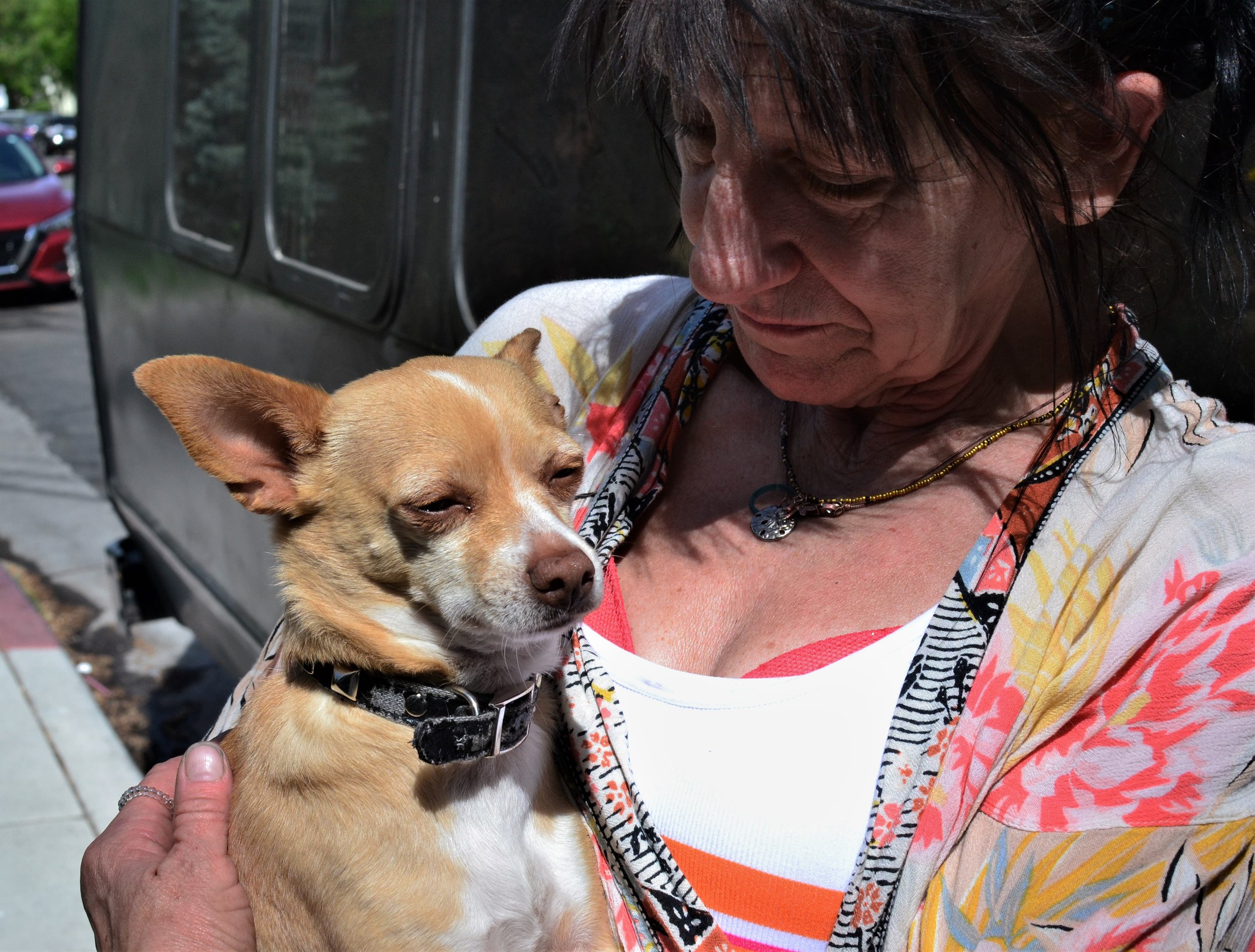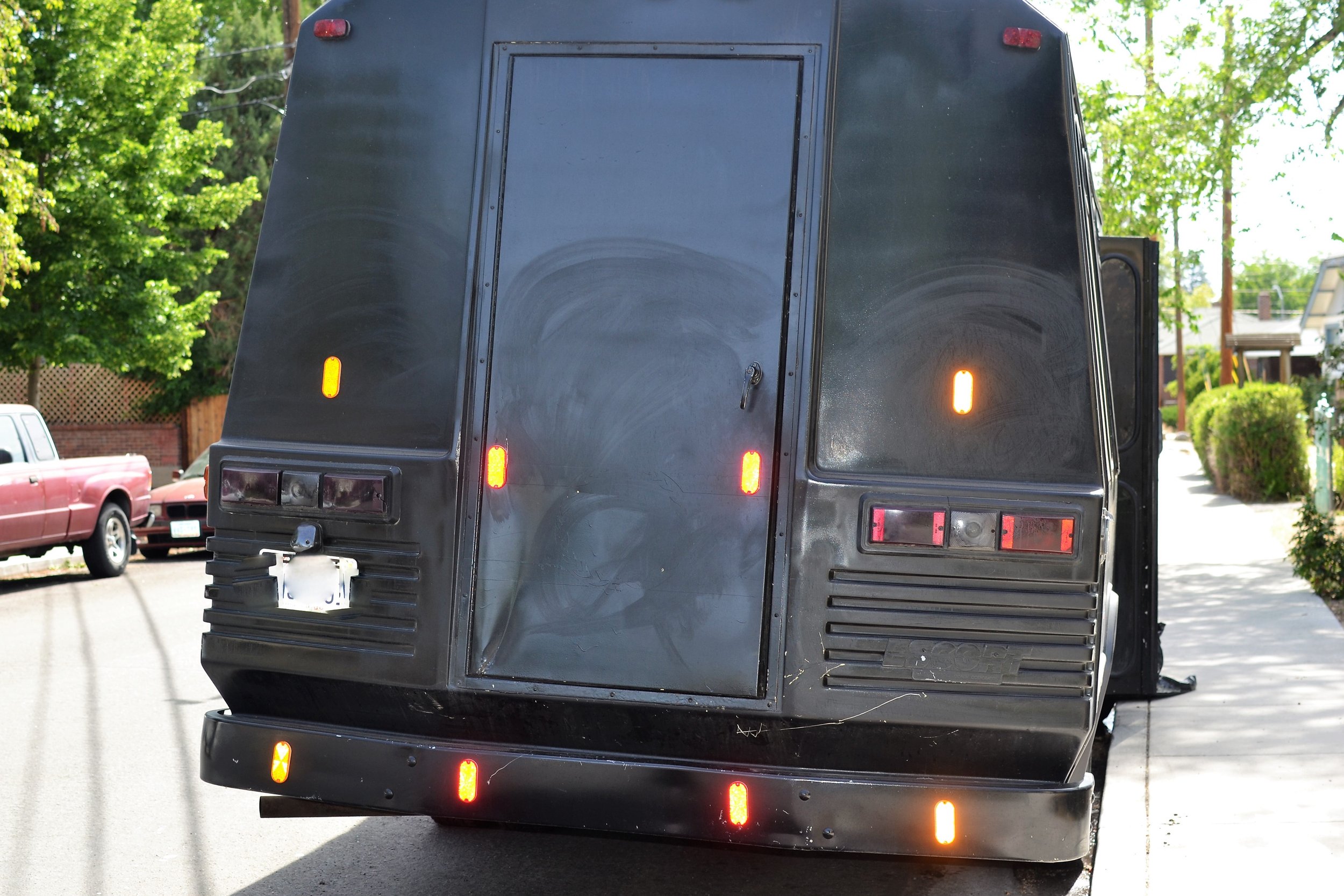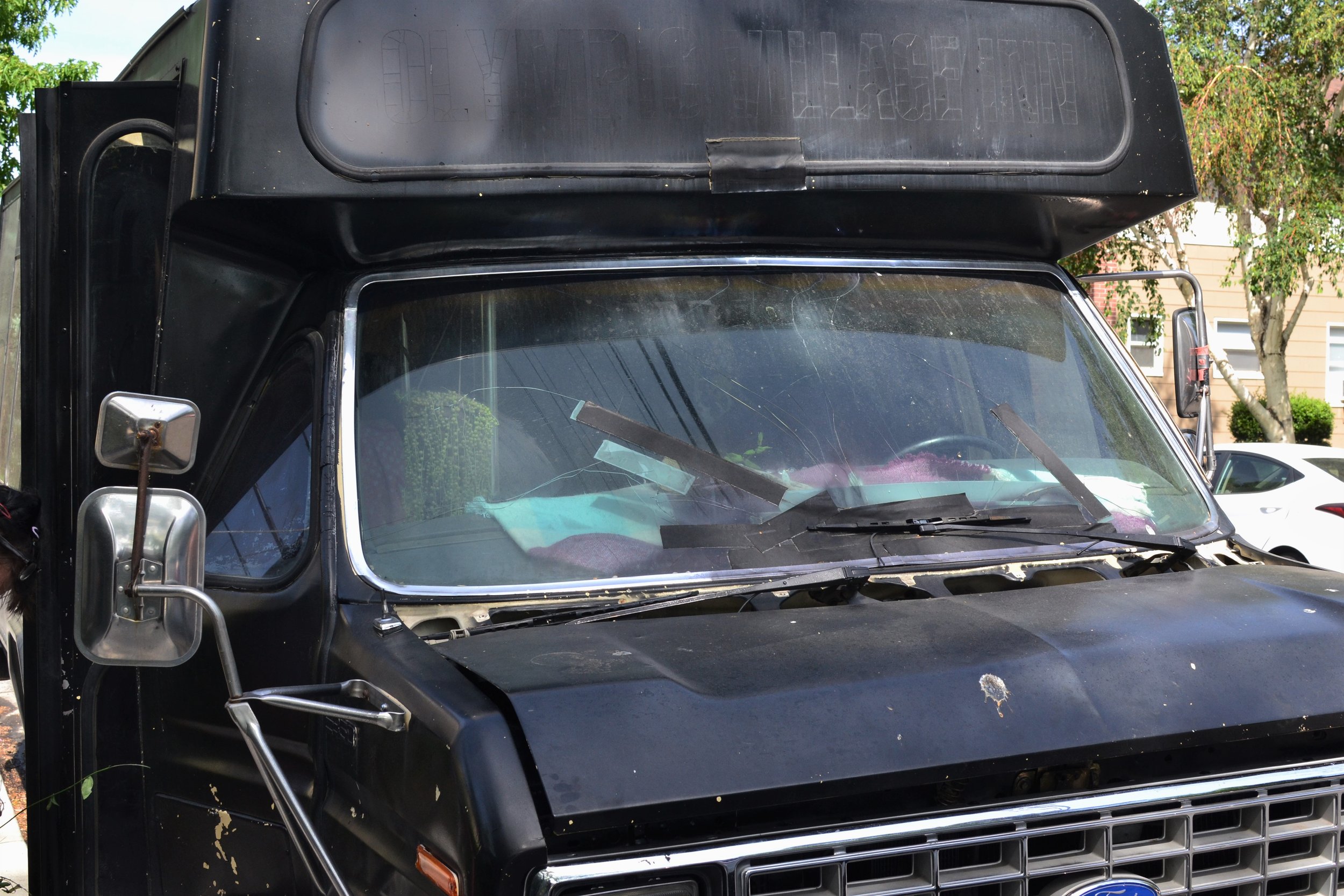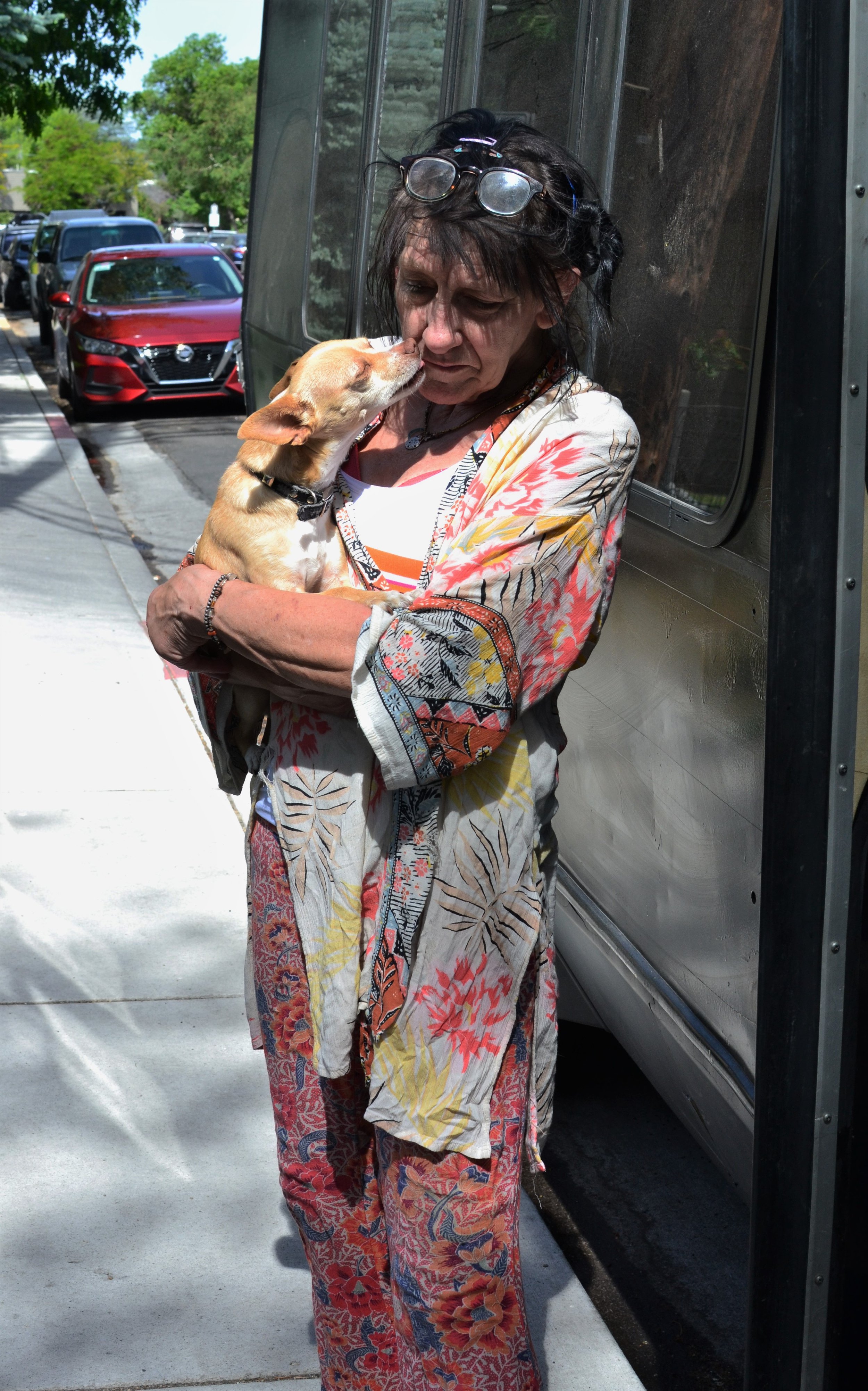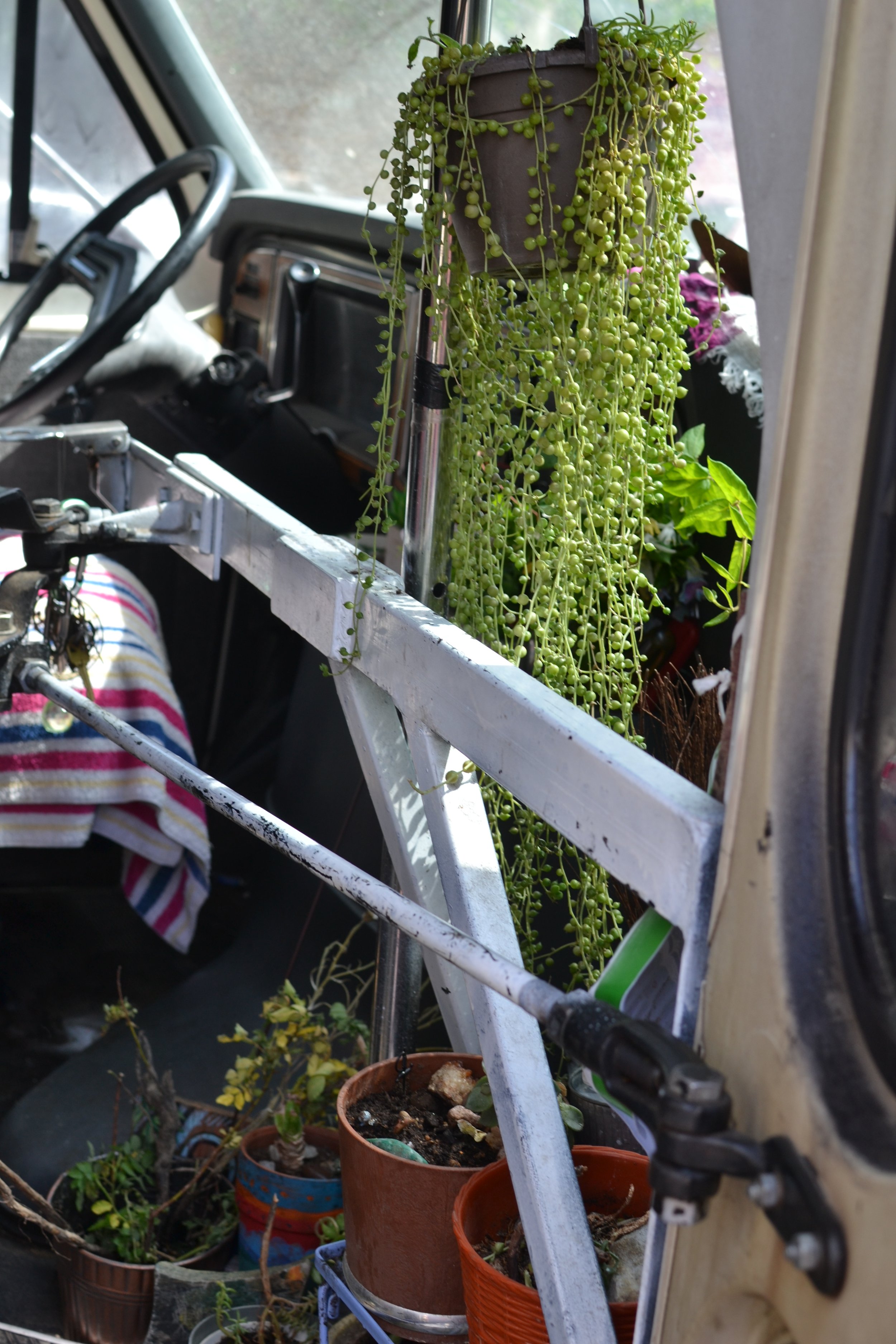On a recent downtown Reno night, Susan was sleeping in her bed, tucked into the back of the converted shuttle bus she has called home for four months. Her small chihuahua, Abigail, was next to her under the covers.
It was around 6:30 AM when her home began to shake as she felt what sounded like sticks hitting the outside of her van and yells of “Wake up. Reno Police. Get the hell out of there.”
Susan had been staying in an unmarked area near the river for about four days, where fishermen often park, near Idlewild Park. Abigail was barking as Susan shakily grabbed a robe and went to her door. There she says she remembers seeing five to six uniformed Reno police.
She had taped a note to the window of the van indicating: “This is my house. Please do not tow my house”. One of the cops she says yelled at her to take down the sign. “That’s bullshit,” she recalls him saying. Another one, she alleges, kicked over the coffee can she had left outside nearby, spreading cigarette butts around the graveled area. “You have a mess to clean up out here, lady,” she remembers him telling her, turning to the other officers and laughing.
“So many, I couldn’t believe it,” Susan said, her eyes tearing at the memory. “They all kept pounding the sticks on the bus, laughing. They told me I had to leave right away.” Susan, a tiny woman in her late fifties, continued with the memory. “Honestly, it made me feel like I was almost naked when I was out there surrounded by all of them. I felt like I should cover up and they ganged up around me."
After they told her she had to leave, Susan told them no problem and went inside her van, more than a little afraid. She says could hear them describe her in derogatory terms, laughing when one said “I wonder where she shits”.
Ryan Connelly from the RPD responded to a request for comment about Susan’s account saying, “the alleged behavior, if true, is not acceptable. If true, it is below our standards of service and what is expected of Reno Police.“
Connelly said police would need a specific date or address to investigate but that Susan could report what happened anonymously through internal affairs. Susan, like many others living in precarious situations, are fearful of retribution and tend to avoid contacting police. Asked if she was interested in filing a report, Susan said she wasn’t, preferring the least amount of contact as possible with police.
Six months ago, Susan would never have seen herself in this situation. Home was previously a small house on Vine St. where she had lived for 14 years. Her daughter, son-in-law and five-year-old grandson lived in adjoining cottages, all on the same property. When one of the cottages was found to be out of code her landlord warned her that there might be changes. She had already fought a rent increase from the property manager who told her that Midtown was “hot”.
“You can’t just decide to call an area something and raise the rent,” Susan said, unconvinced with all the changes going on in Reno. Her landlord died soon after and then his daughters immediately put the property on the market.
Two weeks later, right after Christmas, she and her family were looking for a new place to live. It was hard to find something that would take her and her two dogs. Her daughter, who is pregnant, found a one bedroom, but it does not allow pets. Susan ended up giving her larger dog to her ex-husband and still feels sad about that.
She walks with a limp from bad knees, but continues to do small jobs when she can including garden for people who have trusted her work for years. “One lady, she only wants me, because I’m nice and neat and tidy,” she said. She talks wistfully of the yard full of flowers and fruit trees she had tended before losing her home.
“I loved my house and garden. There were cherry trees, established plants, but they tore it all out," she said. She has worked in the nursery business her whole life and was let go from Home Depot after 17 years during the pandemic.
Inside her bus Susan has kept plants she managed to save from her home, but she worries that she can’t get them enough light.
There are brightly colored tapestries on the seating area and she keeps a picture of her grandson on the inside of the van, along with drawings he makes for her. A jar holds flowers she has cut in the alleys of Reno. She offers a bottle of water to visitors and makes sure they are comfortable.
Susan tries to find parking places close enough to her daughter’s apartment so she can see her grandson often. One day they peeked into the large glass doors of an apartment complex where she had parked for a few days.
There is a swimming pool at that location and she wonders if she could perhaps get a place there, close to family. Neighbors bring her food, talk with her and admire her dog. She sweeps the gutters clean and picks up trash in the neighborhood. The next day though the manager of the complex told her she had to move and accused her of entering the locked building and using “facilities”. It doesn’t matter that Susan denies it-the manager tells her she was seen and so she needs to move or they will call the police.
Susan resumes the now routine job of packing up and moving the bus again. She will look for spots nearby, because she feels it is a safe neighborhood and not everyone treats her with disdain. She can walk to the local Maverik in the morning to use the bathroom and wash. They don’t mind Abigail. When she showers at her daughter's apartment, she has to hide Abigail in a big tote bag.
“I’m not going to just use someone’s yard or next to the river,” she says emphatically. I’m not going to pollute the Earth.”
Susan is always mindful of being a good neighbor. She describes a woman a few streets over who doesn’t mind if she parks next to her law office as long as the city allows her to. “She told me that once she meets the human and knows their name they can stay as long as they like. There has to be respect.”
One of Susan’s concerns is her bus. She did a non-permanent trade for her truck with a friend.
“There are people who when they see the bus," which is painted a very flat black with some taped areas, "they think it’s scary! Honestly, I want to paint it another color so people don’t think I’m going to lure children and eat them", she said.
Susan has a hard time focusing on her future. “I’ve been so consumed with being like this I don’t even know how to find help.”
Public transit in Reno is so irregular that even getting to a place like St.Vincent’s for food becomes a trial. Should she leave Abigail alone in the bus? What if it gets towed with Abigail inside? If she drives to an appointment, she risks losing her parking space. She plans her day around finding bathrooms, going to work for short periods of time so Abigail isn’t left alone for eight hours … Susan says it all begins to seem too much to think about.
One dream she has, while trying to be as inconspicuous as possible in her van, and not being caught, is finishing the children’s book she is writing for her grandson called “Keeping Abigail Warm”. It’s based on Abigail who is often chilly and refuses to wear clothes.
“You know there’s no place for us,” said Susan. “I cry about it every time I’m told I have to move. I’ve never actually felt this way. I feel unwanted.” She hugs Abigail, who slips in perfectly next to her and offers her a kiss. “I’m hoping for the best," she says- her eyes focused on her dog.
“I’m hoping something good will happen.”
